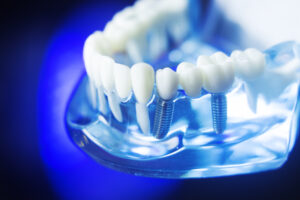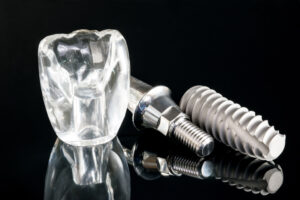Dental implants are more complicated than traditional bridges and dentures, but the results are worth it. Dental implants are built to last a lifetime, and because they’re the only option for replacing the roots of lost teeth, you’ll have a more stable restoration, stronger bite, and protection against future jawbone loss. Implants must be surgically placed into the jaw, and as with any surgical procedure, there is some downtime and healing required. Here’s all you need to know about how long dental implants take to heal.
Understanding the Dental Implant Process
When discussing how long dental implants take to heal, it’s helpful to first understand the process of getting implants.
While certain implant-based restorations can be completed in a single visit, the standard implant procedure requires multiple visits to our office. The implant, the prosthesis (a crown, bridge, or denture), and the abutment that connects the two are the three components of an implant-based restoration, and each is placed at different points in the process.
The process begins with the placement of the dental implant fixture, followed by the attachment of the abutment. Finally, the prosthesis is secured to the abutment, completing your restoration.
Healing From Dental Implant Surgery
The majority of patients are pleasantly surprised to find that their dental implant procedure is easier to recover from than they expected. Dental implant recovery is usually less uncomfortable than recovery from a tooth extraction. If your job isn’t physically demanding, you should be able to return to work the next day; you may experience some bruising, swelling, and tenderness, but this can be treated with over-the-counter pain relievers.
Even if you return to work the next day, you must still follow our aftercare instructions to ensure successful healing. Avoid meals that may slow healing by aggravating the surgical site, as well as intense exercise or activity, which can increase swelling and discomfort. After two weeks, you should be able to resume your normal routine.
Osseointegration
While the soft tissue at the surgical site will recover in a few weeks, the healing process going on underneath the gum line is more important. This is known as osseointegration, and it occurs when your jawbone and dental implants fuse together to build a strong foundation of support for your restoration.
Osseointegration takes several months, but it’s critical not to rush the process because it can mean the difference between a successful dental implant surgery and one that fails.
Abutments and Restorations
After we’ve established that osseointegration has occurred, we’ll move on to abutment placement. Because a small incision is required to access your dental implant and place the abutment, you will need to wait another two weeks for your gums to heal before your final restoration can be fitted and attached to the abutment.
Learn More About Dental Implants
If you’d like to learn more about what you can expect when getting dental implants, contact us today at 732-972-0918 to set up a consultation with Dr. Champagne.
Dental implants are more complicated than traditional bridges and dentures, but the results are worth it. Dental implants are built to last a lifetime, and because they’re the only option for replacing the roots of lost teeth, you’ll have a more stable restoration, stronger bite, and protection against future jawbone loss. Implants must be surgically placed into the jaw, and as with any surgical procedure, there is some downtime and healing required. Here’s all you need to know about how long dental implants take to heal.
Understanding the Dental Implant Process
When discussing how long dental implants take to heal, it’s helpful to first understand the process of getting implants.
While certain implant-based restorations can be completed in a single visit, the standard implant procedure requires multiple visits to our office. The implant, the prosthesis (a crown, bridge, or denture), and the abutment that connects the two are the three components of an implant-based restoration, and each is placed at different points in the process.
The process begins with the placement of the dental implant fixture, followed by the attachment of the abutment. Finally, the prosthesis is secured to the abutment, completing your restoration.
Healing From Dental Implant Surgery
The majority of patients are pleasantly surprised to find that their dental implant procedure is easier to recover from than they expected. Dental implant recovery is usually less uncomfortable than recovery from a tooth extraction. If your job isn’t physically demanding, you should be able to return to work the next day; you may experience some bruising, swelling, and tenderness, but this can be treated with over-the-counter pain relievers.
Even if you return to work the next day, you must still follow our aftercare instructions to ensure successful healing. Avoid meals that may slow healing by aggravating the surgical site, as well as intense exercise or activity, which can increase swelling and discomfort. After two weeks, you should be able to resume your normal routine.
Osseointegration
While the soft tissue at the surgical site will recover in a few weeks, the healing process going on underneath the gum line is more important. This is known as osseointegration, and it occurs when your jawbone and dental implants fuse together to build a strong foundation of support for your restoration.
Osseointegration takes several months, but it’s critical not to rush the process because it can mean the difference between a successful dental implant surgery and one that fails.
Abutments and Restorations
After we’ve established that osseointegration has occurred, we’ll move on to abutment placement. Because a small incision is required to access your dental implant and place the abutment, you will need to wait another two weeks for your gums to heal before your final restoration can be fitted and attached to the abutment.
Learn More About Dental Implants
If you’re ready to start your journey to better oral health with Dr. Richard Champagne and a truly collaborative and compassionate dental team, contact Champagne Smiles in Morganville, NJ today to schedule your first appointment.




